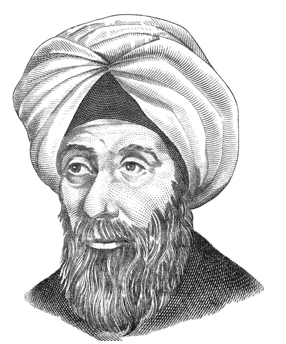
Ibn Khaldun (AD 1332-1406), is the most celebrated historian of the medieval period, belonging to the Arab historiography. He is well-known for his work Universal History.
Kitab-al-Ibar (Universal History)
The book consists of three great books.
1. The first book treats civilization, its essential characteristics, and its influence on human beings.
2. The second book tells the story of the Arabs with important and elaborate references to the history of all the nations from Central Asia to Italy.
3. The third book covers the history of author's own Maghrib (northwest Africa)
Prefixed to these three books is the famous introduction called Prolegomena or Muqaddima, which deals with the science of history and the development of society. Al-Taarif, a short autobiography of the author is suffixed to this book.
In his Prolegomena, Khaldun analysed the science of history which he equates with the science of culture. Here he has explained the nature of historical facts, their relationship, trends and problems and variations, etc. For him, history is not merely the study of events but also their relations among themselves, their meaning and value. For this, a historian needs certain tools and the most important is the knowledge of the nature and causes of actual events, which comes under the science of culture. In this regard, first, he analysed the influence of the environment on social life. Secondly, he traced the origin and development of society through the ages and examined the impact of the past on the present. Thirdly, he gave emphasis psychological desires to determine social habits.
Khaldun classified all sciences into three groups:
1. Theoretical – deals with the knowledge of the truth (Humanities)
2. Practical – deals with the ability for practical action (Science)
3. Productive – for the perfection of things (Technology)
The Science of Culture according to Khaldun is the mixture of all these three branches of knowledge.
In the first book of his Universal History, Khaldun analysed the influence of civilisation on man. In this part, he framed four necessary causes for the genesis of culture. They are:
1. Material Cause: It consists of all the physical factors such as food, shelter, soil, climate, vegetation and all other material needs.
2. Formal Cause: It is the instrument through which culture actually takes shape. Khaldun regarded State as the formal cause, which is responsible for shaping culture.
3. Efficient Cause: It is an abstract idea. He regards solidarity, harmony, moderation and justice as efficient causes necessary for the growth of a culture.
4. Final Cause: It is the idea of common goodness. A man should know the direction in which he is going, and his goal or destiny is happiness.
In other words, Khaldun holds economic factors as Material Cause, political factors as Formal Cause, social factors as Effective Cause and ethical or philosophical factors as Final Cause.
The importance of Ibn Khaldun is that he developed the sociological view of history. He also devised the critical evaluation of the sources to produce truthful accounts of the past.
No comments:
Post a Comment